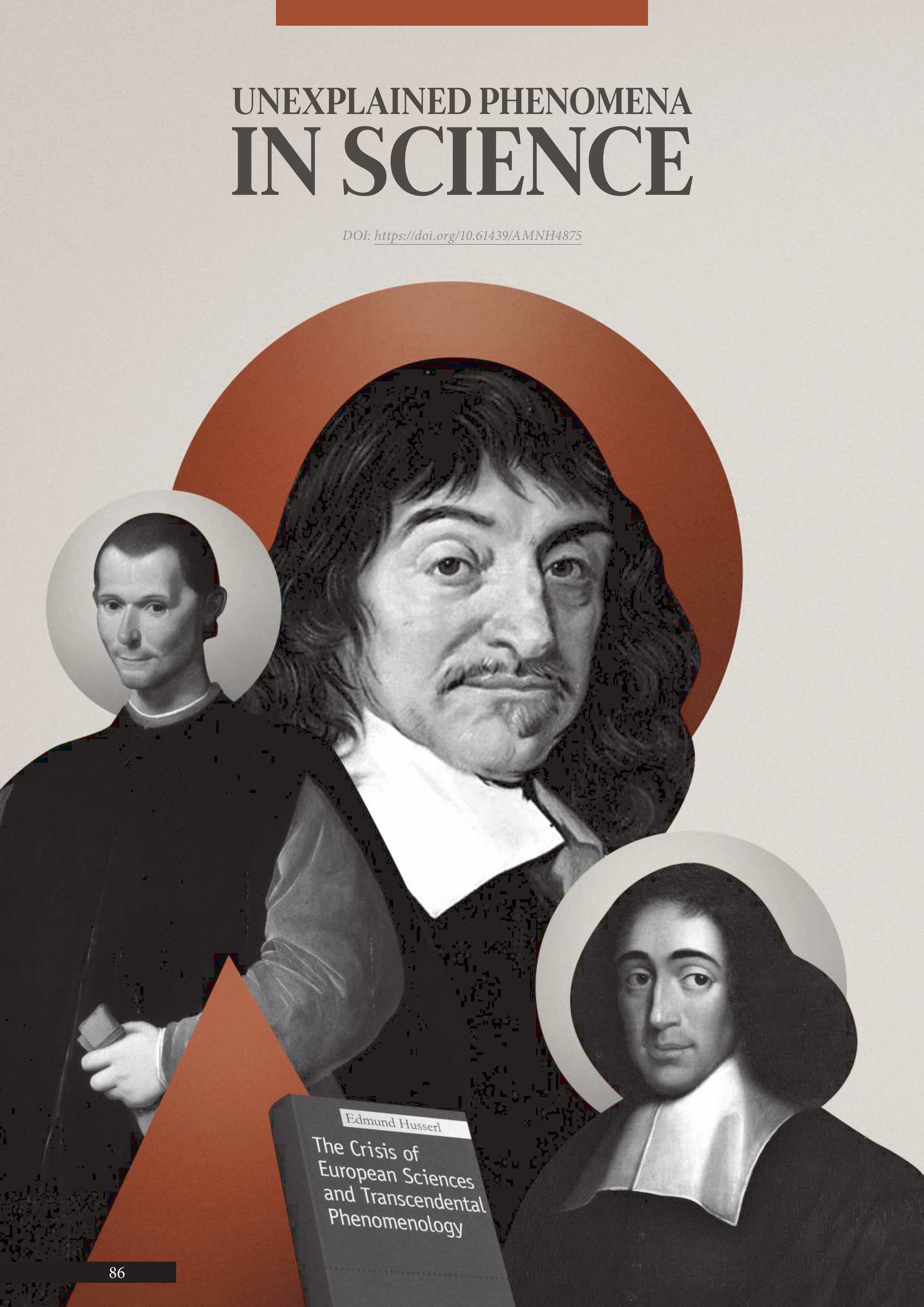Unexplained Phenomena in Science
##plugins.themes.academic_pro.article.main##
Abstract
While the enterprise of modern science seeks to explain phenomena, its own methodology (viz., the scientific method) tends to blind scientists both to phenomena in their original, pre-scientific context and to the very nature or essential motive of science. In order to explain phenomena as they are we need to see them on their own ground or in their own genesis. This applies to the phenomenon of science, as well. Science itself begs to be explained pre-scientifically, or more precisely it begs for an explanation unfolding out of an exploration of the hiatus between science and its pre-scientific world. Only by standing phenomenologically in the interstice between the scientific and the pre-scientific can we truly explain the phenomenon of science, thereby exposing ourselves to an understanding of phenomena as they are and not merely as they are supposed to be relatively to ends alien to them.
DOI: https://doi.org/10.61439/AMNH4875
##plugins.themes.academic_pro.article.details##
References
Andreacchio, M. A. (2021). Saving Superman: A Daunting Lesson from Old Christianity. Voegelin View, January 6. https://voegelinview.com/saving-superman-a-daunting-lesson-from-old-christianity/
Andreacchio, M. A. (2023). Medieval Teachers of Freedom: Boethius, Peter Lombard and Aquinas on Creation from Nothing. Routledge.
Bevir, M. (2007). Esotericism and modernity: An encounter with Leo Strauss. Journal of the Philosophy of History, 1(2), 201-18.
Bultmann, R. (1962). On the problem of demythologizing. The Journal of Religion, 42(2), 96-102.
Caramani, D. (2017). Will vs. reason: The populist and technocratic forms of political representation and their critique to party government. American Political Science Review, 111(1), 54-67.
Cicero, M. T. (1988). Cato maior de senectute. Cambridge University.
Claessens, G. (2014). A sixteenth-century Neoplatonic synthesis: Francesco Piccolomini's theory of mathematics and imagination in the Academicae contemplationes. The British Journal for the History of Science, 47(3), 421-31.
Clemons, M. (2023). Perceiving the Essence: A Husserlian Explication of Aristotle’s Defense of Non-Contradiction (Doctoral dissertation, State University of New York at Stony Brook).
Clausewitz, C. (2003). On war. Penguin UK.
Cory, T.S. (2014). Aquinas on Human Self-Knowledge. Cambridge University Press.
Desmond, W. (2020). The Voiding of Being: The Doing and Undoing of Metaphysics in Modernity (Vol. 61). Catholic University of America Press.
DiClementi, A. & Langiulli, N. (2008). Brooklyn existentialism: voices from the stoop explaining how philosophical realism can bring about the restoration of character, intelligence, and taste. South Bend.
Ellul, J. (2019). The Technological System. Wipf and Stock.
Franke, W. (2021). Dante’s Paradiso and the Theological Origins of Modern Thought: Toward a Speculative Philosophy of Self-Reflection. Routledge.
Gildin, H. (1997). Déjà Jew All Over Again: Dannhauser on Leo Strauss and Atheism. Interpretation: A Journal of Political Philosophy, 25(1), 125-35.
Gunskii, A. Y. (2022). The doctrine of kenosis as the basis of Buddhist-Christian dialogue in the works of the philosophers of the Kyoto school. Issues of Theology, 4(4), 652-72.
Klein, J. (1964). Aristotle: An Introduction. In J. Cropsey (Ed.), Ancient and Moderns: Essays in Honor of Leo Strauss (pp. 51-69). Basic Books.
Kubek, A. (2017). How the Far East Was Lost: American Policy and the Creation of Communist China, 1941-1949. Pickle Partners Publishing.
Machiavelli, N. (2000). Discorsi sopra la prima deca di Tito Livio [Discourses on the First Decade of Titus Livius]. Einaudi.
Mansfield, H. C. (2018). Machiavelli and the Discovery of Fact. In Minkov, S. Y., & Trout, B. L. (Eds.). (2018). Mastery of nature: Promises and prospects (15-29). University of Pennsylvania Press.
Mansfield, H. C. (2023). Machiavelli's Effectual Truth: Creating the Modern World. Cambridge University Press.
Nieuwenhove, R.V. (2021). Thomas Aquinas & Contemplation. Oxford University Press.
O’Connor, D.J. (1967). Reason, Action, and Morality. In Aquinas and Natural Law. New Studies in Ethics. Palgrave.
Oliveira, R. R. (2020). The subversion of ancient thought: Strauss’s interpretation of the modern philosophic project. Manuscrito, 43(3), 1-54.
Olson, R. G. (2015). Scientism and technocracy in the twentieth century: The legacy of scientific management. Lexington Books.
Nimmo, P. T., & Johnson, K. L. (Eds.). (2022). Kenosis: The Self-Emptying of Christ in Scripture and Theology. Wm. B. Eerdmans Publishing.
Pelluchon, C. (2014). Leo Strauss and the crisis of rationalism: another reason, another enlightenment. SUNY Press.
Robson, G. (2023). Big Nihilism: Generation Z, Surveillance Capitalism, and the Emerging Digital Technocracy. Information & Culture, 58(2), 180-204.
Roland-Gosselin, M.-D. (1930). Peut-on parler d’intuition intellectuelle dans la philoso- phie thomiste? In von Rintelen, F.-J. (Ed.). Philosophia Perennis, Regensburg, 729–30.
Schaefer, D. L. (2022). Political Philosophy versus Poetic Individuality: A Response to David Mcllwain's Michael Oakeshott and Leo Strauss: The Politics of Renaissance and Enlightenment. Cosmos + Taxis: Studies in Emergent Order and Organization, 10(1+2), 27-36.
Sorell, T. (2013). Scientism: Philosophy and the infatuation with science. Routledge.
Strauss, L. (1952). The Origin of the Idea of Natural Right. Social Research, 23-60.
Strauss, L. (1957). Machiavelli's Intention: The Prince. American Political Science Review, 51(1), 13-40.
Strauss, L. (1981). Progress or return? The contemporary crisis in Western civilization. Modern Judaism, 17-45.
Strauss, L. (1997). “Preface to Spinoza’s Critique of Religion”. In Jewish Philosophy and the Crisis of Modernity. Green, K. H. (Ed.). SUNY Press; 137-73.
Strauss, L. (2014). Thoughts on Machiavelli. University of Chicago Press.
Vaughan, F. (1982). The Tradition of Political Hedonism: From Hobbes to Mill. Fordham University Press.
Voegelin, E. (1948). The origins of scientism. Social Research, 462-494.
Wood Jr, J. E. (1972). A theology of power. Journal of Church and State, 14(1), 107-124.

